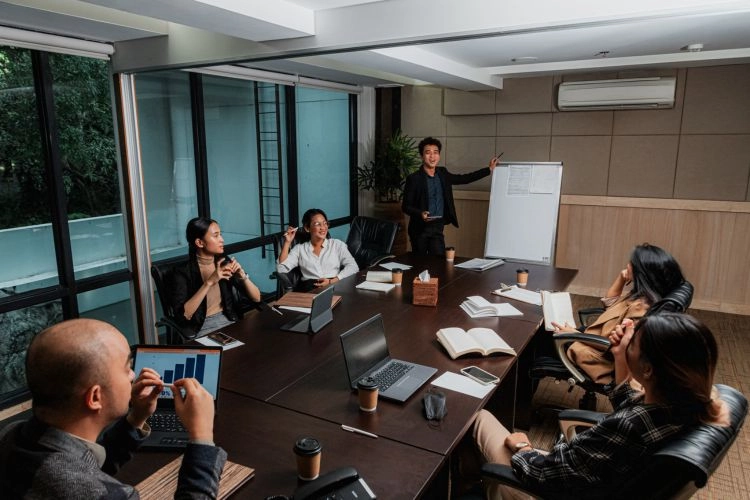How to train Malaysian finance and sustainability teams for MSRF reporting

The successful implementation of Malaysia's MSRF requires Malaysian organisations to develop comprehensive expertise across multiple disciplines, bridging traditional financial reporting with emerging sustainability competencies specific to Malaysia's regulatory environment. This capability building challenge demands strategic investment in training programmes that equip Malaysian finance and sustainability teams with the knowledge, skills and tools necessary to manage the detailed requirements of sustainability reporting under Malaysia's framework.
The convergence of financial and sustainability reporting under Malaysia's MSRF creates new requirements for professional competency that extend beyond traditional accounting and finance skills prevalent in Malaysian businesses. Malaysian finance teams must develop understanding of sustainability concepts, measurement methodologies and reporting standards specific to Malaysia's MSRF, while sustainability professionals must enhance their financial literacy and reporting capabilities aligned with Malaysia's regulatory expectations.
Environmental literacy forms the foundation of effective sustainability reporting under Malaysia's MSRF, requiring Malaysian team members to understand key environmental concepts including climate science, ecosystem services, biodiversity and resource management within Malaysia's unique environmental context. This knowledge provides essential background for assessing environmental risks and opportunities, developing meaningful sustainability strategies and communicating effectively with stakeholders about environmental performance under Malaysia's framework.
Climate science education helps Malaysian team members understand the physical and transition risks associated with climate change, providing the foundation for effective climate-related financial disclosures required by IFRS S2 under Malaysia's MSRF. This includes understanding greenhouse gas emissions, climate modeling, scenario analysis and the relationship between climate change and business performance within Malaysia's geographic and economic context.
Carbon accounting training represents a critical component of sustainability expertise development for Malaysian professionals, covering topics including emission measurement methodologies, scope definitions, activity data collection, emission factor selection and quality assurance procedures specific to Malaysia's MSRF requirements. This training must be both theoretical and practical, providing hands-on experience with carbon accounting tools and software designed for Malaysian companies.
Specialised training programmes designed for Malaysian professionals can significantly enhance carbon accounting capabilities across Malaysia's business community. Institutions like Speeki Academy offer comprehensive carbon accounting courses tailored to Malaysia's MSRF requirements, helping Malaysian professionals develop expertise in emissions measurement, verification and reporting aligned with Malaysia's regulatory framework.
Life cycle assessment (LCA) training helps Malaysian teams understand the environmental impacts of products and services throughout their entire lifecycle, from raw material extraction through end-of-life disposal within Malaysia's economic system. This competency becomes increasingly important as Malaysian companies seek to understand and manage their Scope 3 emissions and develop circular economy strategies under Malaysia's MSRF framework.
for Malaysian professionals covers the IFRS S1 and S2 requirements under Malaysia's MSRF, focusing specifically on the financial materiality approach and climate-related disclosures that form the foundation of Malaysia's framework. This focused understanding helps Malaysian teams manage Malaysia's specific regulatory requirements while building expertise in the internationally recognised ISSB standards that underpin Malaysia's MSRF.
Financial analysis skills specific to sustainability applications include understanding how sustainability factors affect traditional financial metrics for Malaysian companies, developing business cases for sustainability investments and assessing the financial implications of sustainability risks and opportunities under Malaysia's MSRF. This requires training in specialised financial modeling techniques and valuation methodologies relevant to Malaysian businesses.
Data management and analytics training becomes crucial for Malaysian companies as sustainability reporting under Malaysia's MSRF increasingly relies on large volumes of data from diverse sources across Malaysian operations. Malaysian teams must develop competencies in data collection, validation, analysis and visualisation, often using specialised software platforms and analytical tools designed for Malaysia's MSRF compliance.
Comprehensive sustainability management platforms can support training initiatives for Malaysian companies by providing hands-on experience with integrated reporting systems. The Speeki Platform, for example, enables Malaysian professionals to develop practical expertise in sustainability data management, reporting and analysis while working with real-world Malaysia's MSRF requirements.
Stakeholder engagement training helps Malaysian teams understand how to effectively communicate sustainability information to different audiences, including investors, customers, regulators and communities within Malaysia's diverse stakeholder landscape. This includes developing skills in materiality assessment, stakeholder mapping and multi-stakeholder dialogue facilitation specific to Malaysia's cultural and business context.
Risk management training specific to sustainability contexts covers topics including climate risk assessment, scenario analysis, adaptation planning and the integration of sustainability risks into enterprise risk management frameworks for Malaysian companies. This training must address both quantitative and qualitative risk assessment methodologies relevant to Malaysia's economic and environmental conditions.
Assurance and verification training helps Malaysian teams understand the requirements for external assurance of sustainability information under Malaysia's MSRF, including the different levels of assurance, assurance standards and the role of internal controls in supporting assurance processes. This knowledge is essential for Malaysian companies preparing for external assurance requirements under Malaysia's framework.
Regulatory compliance training covers the specific requirements of Malaysia's MSRF as well as other relevant regulatory frameworks that may affect Malaysian organisations. This includes understanding enforcement mechanisms, reporting deadlines and the evolving regulatory landscape for sustainability reporting within Malaysia's jurisdiction and internationally.
Technology training addresses the various software platforms, tools and systems used in sustainability reporting under Malaysia's MSRF, including carbon accounting software, data management platforms and integrated reporting systems. This training must be ongoing as technology platforms continue to evolve rapidly to support Malaysia's advancing sustainability reporting requirements.
Industry-specific training addresses the unique sustainability challenges and opportunities facing different sectors within Malaysia's economy, providing specialised knowledge relevant to Malaysian organisations' specific business contexts. This includes understanding industry-specific metrics, benchmarks and best practices aligned with Malaysia's MSRF sector guidance.
Leadership development programmes help senior managers and executives at Malaysian companies understand their roles in sustainability reporting and management under Malaysia's MSRF, including governance responsibilities, strategic decision-making and stakeholder communication. This training is essential for securing organisational commitment to sustainability initiatives within Malaysian businesses.
Train-the-trainer programmes help Malaysian organisations develop internal training capabilities, enabling them to scale sustainability expertise development efficiently and adapt training content to their specific needs and contexts within Malaysia's business environment. This approach can be particularly cost-effective for larger Malaysian organisations with multiple locations or business units.
Professional certification programmes provide formal recognition of sustainability expertise and demonstrate commitment to professional development for Malaysian professionals. Various organisations offer certifications in sustainability reporting, carbon accounting and environmental management that can enhance individual and organisational credibility within Malaysia's business community.
Cross-functional training programmes bring together team members from different departments within Malaysian companies to develop shared understanding of sustainability concepts and collaborative approaches to sustainability challenges under Malaysia's MSRF. This type of training is particularly valuable for breaking down organisational silos and fostering integrated approaches to sustainability management.
Mentoring and coaching programmes pair experienced sustainability professionals with Malaysian team members who are developing their expertise, providing personalised guidance and support for professional development within Malaysia's sustainability community. This approach can accelerate learning and help Malaysian organisations retain sustainability talent.
External training providers offer specialised programmes developed by subject matter experts, often providing Malaysian professionals with access to cutting-edge knowledge and best practices from other organisations implementing similar frameworks to Malaysia's MSRF. These programmes can be particularly valuable for addressing specific technical competencies or staying current with rapidly evolving standards and practices.
Comprehensive training solutions designed specifically for Malaysian companies can address unique business contexts, systems and procedures while building organisational knowledge and culture aligned with Malaysia's MSRF requirements. Speeki Academy, for example, offers customised training programmes that combine technical expertise with practical application relevant to Malaysian businesses operating under Malaysia's regulatory framework.
Internal training programmes developed specifically for Malaysian organisations can address unique business contexts, systems and procedures while building organisational knowledge and culture aligned with Malaysia's MSRF. These programmes often provide the most relevant and practical training for immediate application within Malaysian companies' specific operational environments.
Continuous learning approaches recognise that sustainability expertise development for Malaysian professionals is an ongoing process requiring regular updates and refresher training aligned with Malaysia's evolving MSRF requirements. This includes staying current with evolving standards, emerging technologies and changing stakeholder expectations within Malaysia's business landscape.
Digital learning platforms can enhance training accessibility for Malaysian companies, particularly those with distributed operations across Malaysia's diverse geographic regions. Online training modules, virtual workshops and interactive learning tools can provide flexible, cost-effective training solutions that accommodate Malaysian professionals' diverse schedules and learning preferences.
Practical workshops and hands-on training sessions provide Malaysian professionals with direct experience applying sustainability concepts and tools relevant to Malaysia's MSRF implementation. These sessions can include case studies based on Malaysian companies, group exercises addressing Malaysia-specific challenges and practical application of software tools designed for Malaysia's regulatory environment.
Assessment and certification components within training programmes help ensure that Malaysian professionals develop genuine competency in sustainability reporting and management under Malaysia's MSRF. These assessments can provide objective measures of learning outcomes while identifying areas where additional training may be needed for Malaysian teams.
The investment in comprehensive sustainability training programmes yields significant returns for Malaysian companies through improved reporting quality, reduced compliance costs, enhanced decision-making capabilities and stronger stakeholder relationships under Malaysia's MSRF. Malaysian organisations that prioritise sustainability expertise development will be better positioned to meet Malaysia's MSRF requirements and achieve their broader sustainability objectives within Malaysia's evolving economy.
Training programme effectiveness can be enhanced through careful needs assessment, customised content development and ongoing evaluation of learning outcomes for Malaysian professionals. This ensures that training investments deliver maximum value while building the expertise needed for successful Malaysia's MSRF implementation across Malaysian businesses and organisations.




